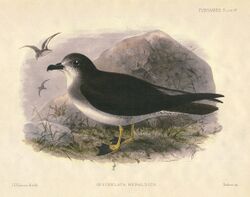Biology:Herald petrel
| Herald petrel | |
|---|---|

| |
| Plate 67 from Godman's 'Monograph of the Petrels.' | |
| Scientific classification | |
| Kingdom: | Animalia |
| Phylum: | Chordata |
| Class: | Aves |
| Order: | Procellariiformes |
| Family: | Procellariidae |
| Genus: | Pterodroma |
| Species: | P. heraldica
|
| Binomial name | |
| Pterodroma heraldica (Salvin, 1888)
| |
The Herald petrel (Pterodroma heraldica) is a species of seabird and a member of the gadfly petrels. Its range includes the south Pacific Ocean and Indian Ocean.
Description
The bird is 35–39 cm (14–15 in) in size, with an 88–102 cm (35–40 in) wingspan. It was formerly considered conspecific with the Trindade petrel and Henderson petrel.
This petrel has various colour morphs: dark and light, as well as intermediates between the two.
Habitat and range
The Herald petrel nests on oceanic islands and atolls, on cliff ledges, ridges or rocky slopes. On some islands, nesting birds are threatened by feral cats and rats.
Found primarily in the south Pacific, it has been seen in Hawaii. In May 2007, a Herald petrel tagged on Raine Island in 1984 was observed off the coast of Mauritius in the Indian Ocean. This greatly increases the known life span and range of the species.[2] In 2009 it was identified as this species, from what was previously an unidentified Pterodroma species, to be breeding on Round Island, 22 km (14 mi) north of Mauritius, in the Indian Ocean.[3]
In August 2017, Queensland Parks and Wildlife Services (QPWS) staff confirmed a Herald petrel chick had hatched on Raine Island after sighting an adult Herald petrel taking care of a single egg in a nest in June 2017. The sighted chick was the first time a Herald petrel was seen to breed in 30 years. Raine Island is the only known Herald petrel breeding site in Australia.[4]
Conservation status
This species is evaluated as "Least Concern" on the IUCN Red List of Threatened Species.[5]
It is listed as critically endangered under the Australian Environment Protection and Biodiversity Conservation Act 1999 (EPBC Act), effective July 2002, and under the Queensland Government's Nature Conservation (Animals) Regulation 2020 (November 2021 list). While there was previously a recovery plan in effect for the species from 2005 to 2015, as it has a high level of protection from government agencies, with relatively few, well-managed threats on the Raine Island population, there is no recovery plan operational as of July 2022[update].[5]
A 2018 study ranked the species ninth in a list of Australian birds most likely to go extinct.[6]
References
- ↑ BirdLife International (2018). "Pterodroma heraldica". IUCN Red List of Threatened Species 2018: e.T22698012A132619211. doi:10.2305/IUCN.UK.2018-2.RLTS.T22698012A132619211.en. https://www.iucnredlist.org/species/22698012/132619211. Retrieved 20 November 2021.
- ↑ James, David.J; McAllan, Ian A.W. (2014). "The birds of Christmas Island, Indian Ocean: A review". Australian Field Ornithology 31 (supplement): S46–S47. http://birdlife.org.au/documents/AFO-Christmas_Island_Supplement-2014.pdf. Retrieved 21 September 2014.
- ↑ Brown, R. M.; Jordan, W. C. (2009). "Characterization of polymorphic microsatellite loci from Round Island Petrels (Pterodroma arminjoniana) and their utility in other seabird species". Journal of Ornithology 150 (4): 925–929. doi:10.1007/s10336-009-0411-5.
- ↑ "Endangered seabird discovery on Raine Island breaks 30 year record". 24 October 2017. http://statements.qld.gov.au/Statement/2017/10/24/endangered-seabird-discovery-on-raine-island-breaks-30-year-record.
- ↑ 5.0 5.1 "Pterodroma heraldica — Herald Petrel". Department of Climate Change, Energy, the Environment and Water, Australian Government. http://www.environment.gov.au/cgi-bin/sprat/public/publicspecies.pl?taxon_id=66973.
- ↑ Geyle, Hayley M.; Woinarski, John C. Z. et al. (20 April 2018). "Quantifying extinction risk and forecasting the number of impending Australian bird and mammal extinctions". Pacific Conservation Biology 24 (2): 157–167. doi:10.1071/PC18006. ISSN 2204-4604. https://www.publish.csiro.au/pc/PC18006. Retrieved 11 July 2022. PDF
- Seabirds, an Identification Guide by Peter Harrison, (1983) ISBN 0-7470-1410-8
- Handbook of the Birds of the World Vol 1, Josep del Hoyo editor, ISBN 84-87334-10-5
- "National Audubon Society" The Sibley Guide to Birds, by David Allen Sibley, ISBN 0-679-45122-6
External links
- "Herald Petrel (Pterodroma heraldica)". http://datazone.birdlife.org/species/factsheet/herald-petrel-pterodroma-heraldica.
- Dropbox images and footage of the Herald Petrel chick on Raine Island, provided by QPWS, 22 August 2017
- Del Hoyo, Josep; Collar, Nigel; Kirwan, Guy M. (4 March 2020). "Herald Petrel (Pterodroma heraldica), version 1.0". Birds of the World. doi:10.2173/bow.herpet2.01. https://birdsoftheworld.org/bow/species/herpet2/cur/introduction.
Wikidata ☰ Q600047 entry
 |

